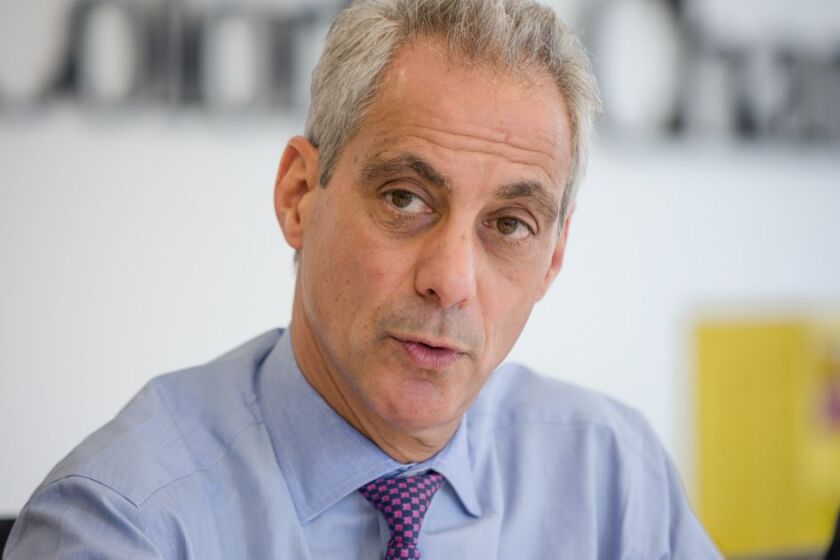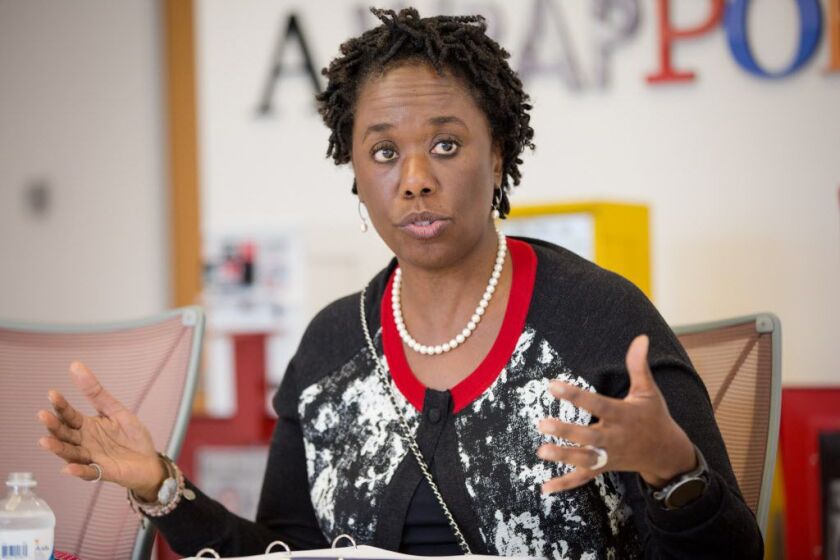Mayor Rahm Emanuel plans to reduce police overtime by $40 million next year as he begins to deliver on his formidable promise to hire 970 additional police officers without raising sales, property or gasoline taxes.
The decision to apparently wean the Chicago Police Department away from its heavy dependence on overtime emerged during a meeting with the Chicago Sun-Times editorial board on the mayor’s $8.2 billion budget for 2017.
The police department spent a record $116.1 million on overtime in 2015 — up 17.2 percent from the previous year — to mask a manpower shortage that has mushroomed under Emanuel with police retirements outpacing hiring by 975 officers.
Overtime spending is expected to be about the same this year.
Under questioning, Budget Director Alex Holt acknowledged that the budget Emanuel presented to the City Council on Tuesday would reduce police overtime to about $76 million. The $40 million cut would be precisely enough to cover salaries and benefits for the additional officers the city expects to hire in the first year of its two-year police hiring surge.
The police department has blown its overtime budget in previous years. Pressed on whether the department would stick to the $76 million overtime budget next year, Holt noted the department is in a “transition period.”
“We’re making a large investment in additional officers over the next two years. We want to make sure [Police Supt. Eddie Johnson] has all the resources he needs during this transition period,” Holt said.
“We know that they’re going to continue to need overtime over the course of the year. We’re not going to, at this stage, have the police department choose between new hires and overtime.”
Emanuel was asked how he managed to absorb the $133.8 million two-year price tag for the new officers without another general tax increase.
“You say Joe Blow on the street will say, `How are you gonna pay for it?’ Actually, Joe Blow doesn’t say that,” Emanuel said. “Since I’m out on the street, Joe Blow usually comes up and says, `Can I make sure some of those additional cops are in my neighborhood.’ That’s what they’re worried about. And we’re gonna make sure those additional resources get there.”
Chicago aldermen remain skeptical about the mayor’s ability to deliver on his promise to fill 471 vacancies, keep pace with rising retirements, and still hire enough police officers in 2017 to add 250 patrol officers, 37 sergeants, 50 lieutenants, 92 field-training officers and 100 detectives to raise an abysmal clearance rate for homicides and shootings. They noted that Emanuel campaigned for a first term on a similar promise, only to break it.
In his appearance at the Sun-Times, the mayor was asked whether those additional officers would be evenly dispersed throughout the city or more heavily deployed to high-crime areas on the South and West sides.
“I’m not gonna do that. That’s Supt. Johnson’s call,” said Emanuel, who has a reputation for micro-managing the police department.
Thanks to the $1.2 billion avalanche of tax increases already imposed to solve the city’s pension crisis, the 2017 budget is expected to be a piece of cake for aldermen to approve.
The package of “revenue enhancements” is a relatively modest $25.4 million.
But it includes a 7-cents-a-bag tax on paper and plastic bags that’s likely to leave consumers feeling nickeled-and-dimed because they will pay it every time they go to the grocery or any other Chicago store without reusable bags.
“I don’t particularly want to nickel-and-dime anybody. But, we also don’t want to spend money . . . for bigger expenses for landfills. . . . The question is, how do we pay for it?” said Emanuel, who blocked a similar bag tax two years ago.
“It’s not about revenue. I adopted a policy on [banning] plastic bags with the City Council. It hasn’t worked. [Taxing bags] actually has proven in other cities to alter peoples’ behavior,” he said.
To generate as much as $18 million, Emanuel also wants to start charging drivers to park in loading zones in three congested wards in or near the downtown area: the 2nd, 27th and 42nd.
Loading zones have long been tied to the proprietor — not the user. In the pilot areas, the user of the loading zone would pay at a rate of $14 an hour. Loading zones in front of hospitals, schools, hotels and day care centers would be exempt.
“Much like the bag fee, we’re hoping to change behavior. The idea of a loading zone is not that the business it’s in front of owns it. You could have a single loading zone on a block to service four or five different businesses. That would help deal with congestion,” Chief Financial Officer Carole Brown said.
Emanuel said there was “no rhyme or reason to how loading zones got awarded” and that opened the door to rampant abuse. “It’s a reform that’s been long overdue,” he said.
Emanuel also wants to double parking meter rates around Wrigley Field — from $2 an hour to $4 — in a deal he’s brokered with the private company that leases the city’s meter system. The new rate would generate roughly $2.4 million and would apply only during Cubs games, concerts and other “special events.”
“The rate is gonna go from $2 to $4 an hour. Still a bargain if you can find a spot,” Brown said. “And we’re gonna test it to see if there’s a positive impact on the neighbors and business owners. If it is a successful pilot, we will consider doing it in other key areas, like around Soldier Field and the United Center.”
To bolster parking-ticket revenue, the city also plans to have its own parking enforcement aides work in tandem with “contractor teams” on weekends.
The Emanuel administration has issued a request-for-proposals for “data analytics software” that will help the city decide where to deploy those weekend ticket writers for maximum efficiency.
The city also plans to get tough on suburban taxicab, limousine and bus companies that make frequent trips to O’Hare and Midway Airports without paying Chicago’s ground transportation tax.
From now on, suburban cabs and limos will be required to pay a daily ground transportation tax of $3.50 on their first trip of the day to either airport. That’s on top of the $4 surcharge paid to McPier by companies using the city app.







